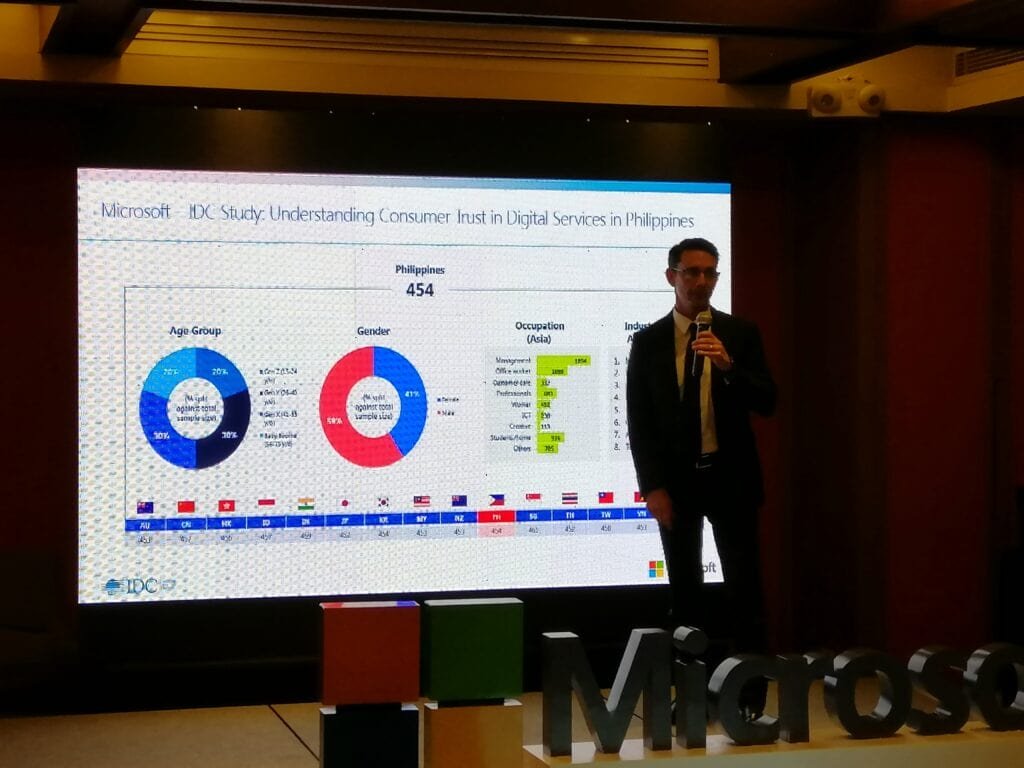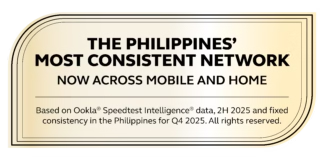17 June 2019 – Despite the boom of digital services in the Philippines, a recent study from Microsoft and IDC Asia Pacific, Understanding Consumer Trust in Digital Services in Asia Pacific, revealed that only less than half (44%) of consumers in the Philippines believed that their personal data will be treated in a trustworthy manner by organizations offering digital services.

Today, almost all transactions and interactions in the Philippines, from organizations and government agencies, to banks and retailers, are becoming digital. At the same time, consumers are becoming more aware of the cybersecurity risks and the risks to the privacy of their personal data, not just from cybercriminals but also from organizations holding on to their personal data.

The study, which surveyed 454 consumers in the Philippines, asked respondents to provide their opinions on the five elements of trust jointly defined by IDC and Microsoft – namely privacy, security, reliability, ethics, and compliance – when using digital services.
The data uncovered that more than two out of five (44%) consumers have had their trust compromised when using digital services. Because of this, more than half (57%) of the respondents would switch to another organization, while two out of five (38%) would reduce the usage of the digital service. Close to one-third (31%) of consumers would stop using the digital service altogether.

“The upside for organizations with a trusted digital platform is tremendous as the Philippines is one of the fastest growing digital services markets in Asia Pacific,” said Andrés Ortolá, Microsoft Philippines’ General Manager. “However, despite consumers’ increasing reliance on digital services, there is still a considerable trust gap that needs to be addressed. Most consumers still do not perceive organizations to be trusted data stewards. We urge business leaders to do more to understand what drives consumer trust and focus on how they can build trust and make it a key competitive advantage for their digital services,” he added.
The study revealed that consumers feel that all five elements of trust are almost equally important to them. Specifically, security (87%), privacy (93%) and compliance (89%) emerged as the top three most important elements. Consumers also have the highest expectations of trust from financial services institutions, followed by education institutions and healthcare organizations.
Trust in Digital Services is Fragile
As organizations in the Philippines continue to transform their business models, offerings and customer engagement strategies, the range of digital services available to consumers continues to grow in number and variety.
The data showed that establishing a trusted platform needs to be a priority in organizations’ strategy for digital services as only 6% of consumers prefer to transact with an organization that offers a cheaper but less trusted digital platform. Additionally, almost three out of four (73%) of consumers highlighted that they would recommend a trusted digital service to others even if the cost is higher.
“Trust is critical for organizations to succeed in this digital world as consumers overwhelmingly prefer to transact with organizations with a trusted digital platform,” said Randy Roberts, IDC Philippines Head of Operations. “As competition between digital services becomes more intense and global in nature, advocacy through word of mouth can be a strong differentiator for the organization and a shot in the arm for the brand.”
Building Trust in Artificial Intelligence and Digital Services
As technology continues to transform how we live, work and play, all stakeholders in the industry providing digital services and harnessing the capabilities of artificial intelligence (AI) should be responsible for fulfilling the five elements of trust with their customers directly.
However, the responsibility of building trust should not just be on the shoulders of these organizations providing digital services but also the broader industry, including government institutions and technology companies.
According to the study, Filipinos feel that the government (44%) should take the lead in building trust, followed by technology companies (35%), indicating the need for a stronger partnership between governments and technology companies.
When it comes to fostering trust in AI technologies, consumers feel that the technology companies (43%) and government (36%) should take the lead in ensuring AI is used in a trusted manner.

“To establish a trusted framework for the development and usage of AI and technology in general, we must first consider its impact on individuals, businesses and society. This would require a broader debate that involves the appropriate stakeholders, including the government and technology companies. These dialogues would need to be backed by actions, including forging closer partnerships and facilitating greater knowledge exchange. These are all necessary steps that will enable us to collectively establish a well-balanced, holistic baseline for trust for the entire industry,” Ortolá concluded.
For more information, visit http://bit.ly/Microsoft-IDC-Consumer-Trust




